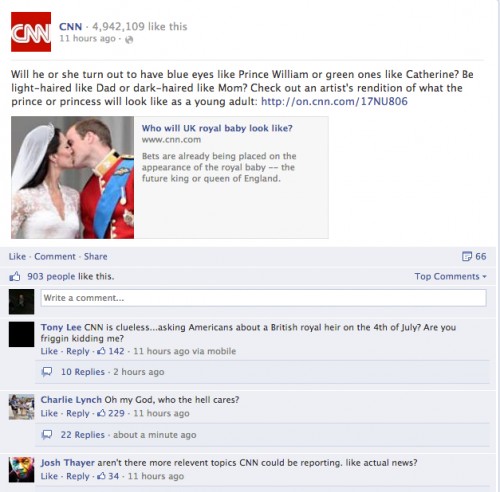George Zimmerman was found not guilty in the murder of Trayvon Martin. And yet, Martin, a 17 year old boy, is dead. Killed by Zimmerman’s lethal gunshot. Protestors have taken to Twitter, Facebook, and the streets. Here, I want to try to make sense how this case is far more complex legally than it is morally. In what follows, I argue that both bodies and laws are technologies—or more specifically—materialized action, and that the intersection of their imbedded values and assumptions afford justices processes which feel, at a visceral level, generally unjust. more...
Hello Reader! In support of Nathan’s Epic Roadtrip (we all know how I feel about Epic Roadtrips), I’ll be minding In Their Words for the next few weeks. Enjoy!
“Why do we prefer to see a brown man forcibly rape a white woman, rather than romance her?”
“Silicon Valley is ‘starting to come into a realization of our own power” in politics’” more...
 I remember hearing somewhere that one of the most important things you can teach a child is to delay gratification.
I remember hearing somewhere that one of the most important things you can teach a child is to delay gratification.
Give a five-year-old a choice between a cookie on the table in front of him right now and two cookies 15 minutes from now, and chances are he’ll take the one cookie right now. Maturity is about learning to live within your means. You want something nice, you save up for it. You resist blowing your entire paycheck on bling so that when the first of the month comes you have enough money to cover the rent.
It’s obvious that the consumer economy wants us to ignore these basic principles. more...
This post discusses the HBO show Game of Thrones and George R.R. Martin’s novel series A Song of Ice and Fire. There will be spoilers up until the events of season three’s finale, as well as a discussion of physical, emotional, and sexual violence against women.
 I admit it—I am one of those insufferable people who read the books. I’m the worst kind of Game of Thrones viewer—the one who can’t watch an episode without pointing out how “in the books, x happens this way instead.” I love telling fellow GoT viewers that Tyrion Lannister actually led the vanguard in the battle between Stark and Lannister, rather than being knocked unconscious before the fighting began. I get a sick pleasure from describing how Daenerys’ hair is completely burned away when she survives Drogo’s pyre funeral. And yes, it still chaps my ass that the show denies Samwell Tarly the triumph of sending out the ravens after the battle with the White Walkers at the Fist of the First Men. more...
I admit it—I am one of those insufferable people who read the books. I’m the worst kind of Game of Thrones viewer—the one who can’t watch an episode without pointing out how “in the books, x happens this way instead.” I love telling fellow GoT viewers that Tyrion Lannister actually led the vanguard in the battle between Stark and Lannister, rather than being knocked unconscious before the fighting began. I get a sick pleasure from describing how Daenerys’ hair is completely burned away when she survives Drogo’s pyre funeral. And yes, it still chaps my ass that the show denies Samwell Tarly the triumph of sending out the ravens after the battle with the White Walkers at the Fist of the First Men. more...

For many people, moving—especially to another city, state, or country, instead of just across town—is an opportunity to sort through (and likely, discard) possessions, in hope of making the impending relocation process less of an ordeal. I did this when I moved back to Massachusetts from California last February; I actually gave away more than 65 percent of my worldly possessions (by volume) before trading a two-bedroom house in West Oakland for a one-bedroom apartment in Cambridge. This pales in comparison, however, to what my parents are currently undertaking: After 28 years in the same house, they’re preparing to move across state lines next month. For them, July has so far been all about sifting through the accumulated sediment of so much time in one enclosed space; since this is the Internet age (and since my mom has access to a scanner), for me July has been all about a steady stream of emailed highlights from rediscovered family—and personal—history. more...
Laurie Penny’s great new piece about Manic Pixie Dream Girls (MPDGs) has me thinking about the role of women/femininity in the compositional structure of music, film, and other media. Penny uses a narrative metaphor to explain the subordinate role of MPDGs in contemporary patriarchy: patriarchy expects and encourages women to ghostwrite or be, as Penny puts it, “supporting actresses” in men’s stories. When women (such as Penny) craft their own autobiographies with themselves as the protagonist, this upsets both patriarchal conventions, and our aesthetic sensibilities, which have been trained to expect and enjoy these conventions.
But, especially in light of the finale of this past season’s Doctor Who (so, uh, need I say it: spoilers) I think the MPDG supports men’s/masculinity’s centrality–in other words, patriarchy–in specific ways, ways that are uniquely appropriate to the compositional logic of contemporary media.
The British Channel Four series, Black Mirror, tells a series of disconnected stories taking place in what might be parallel worlds, in which technology is resolutely familiar, but always a bit uncanny. It is a show of this epoch, and of the insecurities and fears which tag along as we watch history unfold itself in front of us. In the same way that The Twilight Zone screened our nagging questions about Mutually Assured Destruction, space flight, and the lurking Other inside the suburban facade, Black Mirror delves into our doubts about social media, ubiquitous computing, surveillance society, and the justice of consumerism, as we struggle to comprehend the growing, always glitching, network around us. The show is, according to Wikipedia, quite popular in China, which might be all that you need to know. more...
“There simply isn’t much of a market for tech-savvy haute couture”
“In this paper, we investigate if widely used influence scores are vulnerable and easy to manipulate”
“The TSA’s Instagram feed shows the artistic side of confiscated material”
““cyber” has, in a way, returned to its dark science-fiction roots”
“What the NSA needs to do, clearly, is start giving away Jay-Z albums”
“Power moves through drones; so we can write and talk and think through drones. So we have to“ more...

I “Like” CNN on Facebook. Not because I enjoy getting the news on my Facebook feed (my friends do that) but because I love watching a bunch of people hate on CNN. As the above photo demonstrates, CNN tends to show its ass a lot. Asking your readers about the Royal Family’s baby on the 4th of July, will undoubtedly piss off a dozen different demographics. It is constantly being called out for doing all of the things we know are wrong with American cable news. There are dozens, in some cases even hundreds, of comments about calling a revolution a coup, ignoring the important parts of stories, and generally missing the mark when it comes to stewarding and curating these weird things we generally call “national conversations.” I just want to know why CNN chooses to subject their brand to such public, naked criticism on a daily basis. more...

Edward said their thereness is just
a shadow on the sky. Before depredating colonies
of pests, the selfish herd moves
with all the precision of an equation, unraveled
by game controllers north of Tampa. Of starlings,
bats, and drones, only drones are native to Florida.– Phillip Barron, “A Murmuration of Drones”
Murmuration is over. The drones are still there.
Back before the beginning of June, I stated the intention to write something in reflection once June’s “festival of drone culture” concluded. At the time, I was also reflecting on my own writing in relation to drones, looking for some of the dominant themes that seemed to be emerging in my own work. I said then that creative writing – both fictional and less so – was the emergence of things of which one may or not be aware, and as such it has the potential to be endlessly surprising. With so many creative voices brought together around a single theme, creating audiovisual artwork, essays, fiction, poetry, and combinations of some or all, I was interested to see in what areas, if any, there appeared to be a kind of mutual focus.


